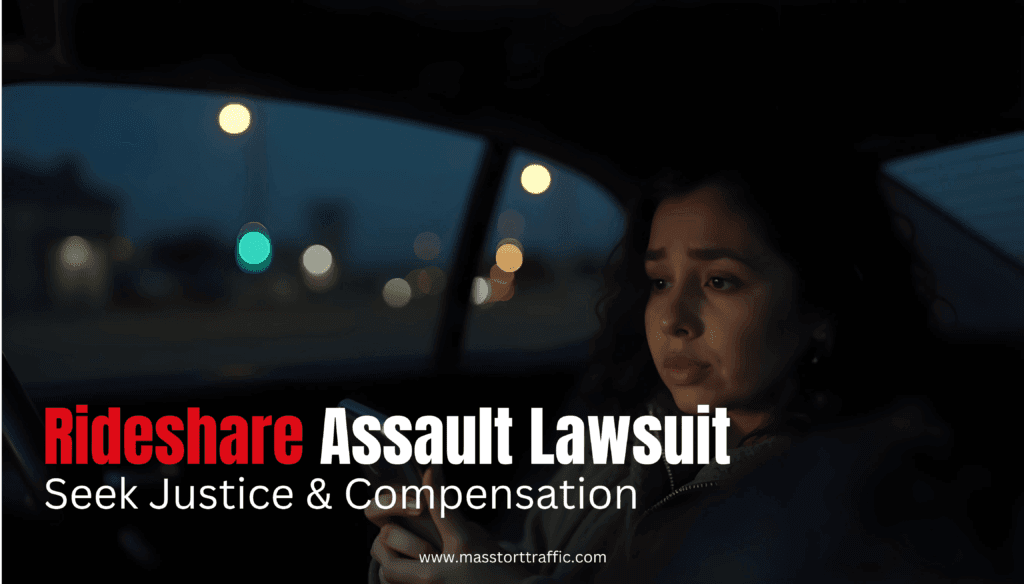Introduction: The Dark Side of Ridesharing – What Victims Need to Know
Rideshare services like Uber and Lyft have revolutionized transportation, offering convenience and affordability. However, a troubling reality has emerged—rideshare assault cases have become more common, leaving victims traumatized and unsure of their legal options.
If you’ve experienced an assault during a rideshare trip, you may be entitled to compensation. This guide breaks down everything you need to know about filing a rideshare assault lawsuit, holding negligent parties accountable, and securing justice.
Table of Contents

Understanding Rideshare Assault Lawsuits
What Qualifies as a Rideshare Assault?
Not every bad experience in an Uber or Lyft qualifies as a lawsuit. However, if you were physically or sexually assaulted by a rideshare driver—or even by another passenger—you may have grounds for legal action.
Recent reports show a concerning rise in rideshare-related assault cases. Uber’s own safety report revealed nearly 10,000 sexual assault allegations over a two-year period. Many victims feel powerless, but legal action can provide justice and financial relief.
Who Can Be Held Liable in a Rideshare Assault Case?
Several parties could be responsible in a rideshare assault lawsuit:
- The Driver – If they engaged in violent or inappropriate behavior.
- The Rideshare Company – If they failed to conduct proper background checks or ignored prior complaints.
- Third Parties – If another passenger or an outside party was involved in the attack.
While Uber and Lyft argue that their drivers are “independent contractors,” courts have increasingly questioned this stance. Victims may still be able to hold these companies liable for negligence.
Legal Rights of Rideshare Assault Victims
Can You Sue Uber or Lyft for Assault?
Yes, but it’s not always straightforward. Rideshare companies often try to limit their liability using complex legal agreements. However, many victims have successfully sued Uber and Lyft for:
- Negligent hiring (failing to conduct thorough background checks)
- Failure to protect passengers
- Inadequate safety policies
An experienced rideshare assault lawyer can help you determine the best legal strategy.

What Damages Can You Recover?
If you win a rideshare assault lawsuit, you may be entitled to:
- Medical expenses (hospital bills, therapy, medications)
- Lost wages (if the trauma affected your ability to work)
- Pain and suffering (emotional distress, PTSD)
Real-Life Example: Jane Doe filed a lawsuit against Uber after a driver assaulted her. The company initially denied responsibility, but after legal pressure, she received a $1.2 million settlement to cover medical bills and emotional trauma.
Steps to Take After a Rideshare Assault
Immediate Actions to Strengthen Your Case
If you’ve been assaulted in a rideshare vehicle, here’s what to do immediately:
- Call 911 – Report the incident to the police.
- Seek medical attention – Even minor injuries should be documented.
- Gather evidence – Take screenshots of ride details, messages, and driver info.
- Report to the rideshare company – File a formal complaint.
- Contact a lawyer – Legal professionals can guide you through the next steps.
How to File a Rideshare Assault Lawsuit
The Legal Process Explained
Filing a lawsuit can seem overwhelming, but the process is straightforward when handled by the right attorney. Here’s a step-by-step breakdown:
- File a police report – This creates an official record of the incident.
- Consult with a lawyer – They’ll assess whether you have a strong case.
- Gather evidence – Texts, receipts, and witness statements can strengthen your claim.
- File the lawsuit – Your attorney will submit the necessary legal paperwork.
- Negotiate or go to trial – Many cases settle out of court, but some require litigation.
How Long Does It Take to Settle a Rideshare Assault Case?
Every case is different, but settlements typically take 6 months to 2 years. Factors affecting timelines include:
- The complexity of the case
- The willingness of Uber or Lyft to settle
- The strength of the evidence
Victims should prepare for a lengthy but worthwhile process in their pursuit of justice.
Conclusion: Take Action – Your Rights Matter
No one should suffer in silence after a rideshare assault. You have the right to seek justice, hold companies accountable, and receive financial compensation.
If you or someone you know has been assaulted in a rideshare vehicle, don’t wait. Consult an experienced rideshare assault lawyer today to explore your legal options.

Final Thoughts:
This guide provides a clear roadmap for rideshare assault victims, ensuring they know their rights and legal options. By spreading awareness, we can help create a safer rideshare experience for everyone.





